| Srl | Item |
| 1 |
ID:
161611
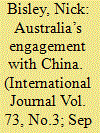

|
|
|
|
|
| Summary/Abstract |
This paper examines how Australia has managed its relationship with China. It looks at the broad trends in the relationship, with a focus on the decades after recognition in 1972. The second part examines the recent past, and particularly the ways in which Australia’s active courtship of China has begun to be tempered by concerns about the destabilizing security and strategic consequences of the country’s return to power. It assesses the options Australia faces and the growing polarization of opinion between security “hawks” and economic “doves” in public debate about Australia’s future, and then charts where Australian policy is currently placed. The paper concludes by explaining why Australia finds taking a nuanced position in relation to its engagement with China so difficult.
|
|
|
|
|
|
|
|
|
|
|
|
|
|
|
|
| 2 |
ID:
161613
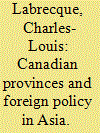

|
|
|
|
|
| Summary/Abstract |
Non-central governments in Canada have become increasingly active on the world stage, most notably in the Asia Pacific region. The scholarly works on Canada’s foreign policy in Asia tend to focus either on the federal government as the main actor, or on the “other diplomacies” of non-governmental actors; little attention has been paid to the increasing role of non-central governments in Asia. This article, therefore, contributes to the discussion by documenting and evaluating Canadian provinces’ international activities in the Asia Pacific. It also situates these activities within Canada’s foreign policy in the region, and assesses how important provinces have become in Canada–Asia relations. This paper first reviews the literature on non-central governments and foreign policy to expose the key forces pushing and pulling Canadian provinces to be increasingly active internationally. It then details the provinces’ international activities in Asia, and locates them within Canada’s foreign policy in the region.
|
|
|
|
|
|
|
|
|
|
|
|
|
|
|
|
| 3 |
ID:
161615
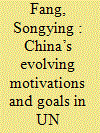

|
|
|
|
|
| Summary/Abstract |
This brief examines how the motivations and goals of China’s participation in United Nations (UN) peacekeeping operations have evolved since 1990 as a result of China’s changing national interests. We conclude that China is unlikely to abandon its long-held foreign policy principle of non-interference. However, motivated by a desire to be seen as a responsible global power, Beijing is seriously considering a more proactive approach to humanitarian crises, which may include direct intervention. Furthermore, as a significant contributor of troops and financing, China is uniquely positioned to represent the perspectives of both developing and developed countries in UN peacekeeping. To do so, Beijing will need to increase its leadership role in UN peacekeeping operations and offer creative ideas about how to promote reconciliation and development in post-conflict societies.
|
|
|
|
|
|
|
|
|
|
|
|
|
|
|
|
| 4 |
ID:
161614
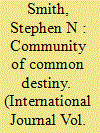

|
|
|
|
|
| Summary/Abstract |
This essay will discuss China’s re-emergence as a great power through the lens of the English School. Following Ian Clark, I reconceptualize international society as a set of historically changing principles of legitimacy. I argue that China’s “new assertiveness” under Xi Jinping is best explained by China’s pursuit of legitimacy in an international arena where norms of legitimate modes of governance, development, and ordering principles have long been defined by the West. Furthermore, this essay will examine one recent development in Chinese International Relations theory, gongsheng, which purports to offer an alternative normative basis for interstate order, and probe its relationship to Xi Jinping’s recent declaration to build a “community of common destiny” in Asia.
|
|
|
|
|
|
|
|
|
|
|
|
|
|
|
|
| 5 |
ID:
161609
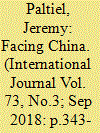

|
|
|
|
|
| Summary/Abstract |
This paper examines the challenges Canada faces in forging a diplomacy appropriate for the changing power configuration in global politics. The reshaping of the international order—with China pushing for a more hierarchical view of international relations, and the administration of Donald Trump repositioning the USA in global politics—provides Canada with the impetus to rediscover the traditional role that middle powers played as reliable middle managers for the global project. Today, such “middle management” is deprived of a reliable role. Since China has yet to articulate a coherent normative vision of a new global order, and the USA is retreating to a purely transactional view of trade and diplomacy, Canada and other middle powers have few choices other than to try to adapt to the changes in the hopes of sustaining the normative mesh that has upheld the post-war order.
|
|
|
|
|
|
|
|
|
|
|
|
|
|
|
|
| 6 |
ID:
161610
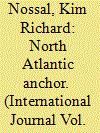

|
|
|
|
|
| Summary/Abstract |
This paper surveys Canada’s ambivalence towards the Asia Pacific, and seeks to put that ambivalence into the broader context of the dominant strategic perspective in Canada that has privileged, and continues to privilege, a North Atlantic focus for Canadian foreign and defence policy. It argues that Canada’s laggardly approach to Asia Pacific diplomacy can be best explained by the widespread perception among Canadians—and their government—that the North Atlantic alliance should remain the key driver of Canadian foreign and defence policy. Indeed, this geostrategic outlook has actually intensified with the election of Donald J. Trump and his unorthodox approach to the transatlantic alliance and the liberal international order. I argue that this North Atlantic outlook, so dominant for so much of Canada’s history, will continue to anchor Canadian foreign and defence policy, making Canada’s engagement in the Asia Pacific more problematic.
|
|
|
|
|
|
|
|
|
|
|
|
|
|
|
|
| 7 |
ID:
161616
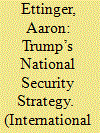

|
|
|
|
|
| Summary/Abstract |
Donald Trump’s 2017 National Security Strategy (NSS) promises to put “America first.” However, it is only a partial break from convention, and evinces a deep current of incoherence in Trump’s foreign policy. The NSS attempts to combine two incompatible worldviews into a single doctrine: the president’s “America First” nationalism and the seventy-year-old internationalist consensus among the US foreign policy establishment. Not only does it betray strategic dissonance, it portends an impossible working relationship between Trump’s insurgent nationalism and the traditionalism of the US foreign policy bureaucracy.
|
|
|
|
|
|
|
|
|
|
|
|
|
|
|
|
| 8 |
ID:
161612
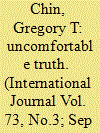

|
|
|
|
|
| Summary/Abstract |
This article examines the behavioural patterns of successive Canadian governments in responding to three takeover attempts of iconic high-value Canadian corporates by large state companies from China. The first is China Minmetals Corporation’s attempt to acquire Noranda in 2004–2005 during the Liberal government of Paul Martin, the second is China National Offshore Oil Corporation’s acquisition of Nexen in 2012 during the Conservative government of Stephen Harper, and the third is China Communications Construction Corporation International’s bid for Aecon Group in 2017–2018. This analysis highlights some important similarities in the behavioural response of the Canadian governments across the three cases: ambivalence and wariness. Policy lessons are addressed in the conclusion.
|
|
|
|
|
|
|
|
|
|
|
|
|
|
|
|